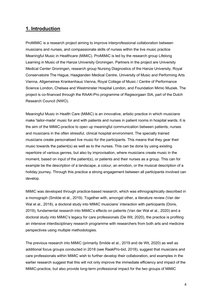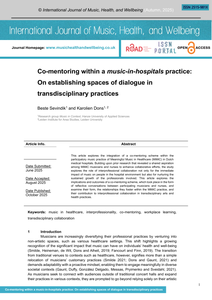This document consists of the research report of Work Package 3 of ProMiMiC's locations Groningen and The Hague. Through the implementation of MiMiC-projects in the form of ‘living labs’, research data was generated leading to insights into (1) concepts of interprofessionality between musicians and healthcare professionals, (2) effects of the MiMiC-practice on nurses’ compassionate skills in contact with patients and (3) the influence of the various contexts on the MiMiC-practice. Given the fact that hospitals are the site of study in ProMiMiC, the research activities of Work Package 3 got highly affected by the COVID-19 pandemic. It led to additional questions and expansion of the MiMiC practice to directions that the consortium hadnot foreseen.--- Update September 2025: Chapter 5 - episodes added as a separate file for open access.
DOCUMENT

This article explores the integration of a co-mentoring scheme within the participatory music practice of Meaningful Music in Healthcare (MiMiC) in Dutch medical hospitals. Building upon prior research that revealed a shared aspiration among MiMiC musicians and nurses to enhance collaborative efforts, the study explores the role of interprofessional collaboration not only for the immediate impact of music on people in the hospital environment but also for nurturing the sustained growth of the professionals involved. This article explores the implications and outcomes of a co-mentoring scheme, which took place in the form of reflective conversations between participating musicians and nurses, and examine their form, the relationships they foster within the MiMiC practice, and their contribution to interprofessional collaboration in transdisciplinary arts and health practices.
DOCUMENT

Brochure about the Meaningful Music in Health care (MiMiC) practice.
MULTIFILE

A musical improvisation inspired by a beautifulsummer day or by a song by Elvis; for patientsadmitted in hospital for an operation, music canhave healing powers. With the research projectMeaningful Music in Health Care (MiMiC), thattook place from autumn 2015 until 2018, the researchgroup Lifelong Learning in Music (LLM), togetherwith the department of surgery of the UniversityMedical Center Groningen (UMCG), researched thepractice of live music for hospital patients and theirhealth care professionals. For the research groupLifelong Learning in Music the focus of the researchwas on the meaning of this musical practice formusicians and health care professionals, and onthe development of this practice.The research of UMCG concentrated on the effectsof live music on the recovery and wellbeing of patients
DOCUMENT

poster voor de EuSoMII Annual Meeting in Pisa, Italië in oktober 2023. PURPOSE & LEARNING OBJECTIVE Artificial Intelligence (AI) technologies are gaining popularity for their ability to autonomously perform tasks and mimic human reasoning [1, 2]. Especially within the medical industry, the implementation of AI solutions has seen an increasing pace [3]. However, the field of radiology is not yet transformed with the promised value of AI, as knowledge on the effective use and implementation of AI is falling behind due to a number of causes: 1) Reactive/passive modes of learning are dominant 2) Existing developments are fragmented 3) Lack of expertise and differing perspectives 4) Lack of effective learning space Learning communities can help overcome these problems and address the complexities that come with human-technology configurations [4]. As the impact of a technology is dependent on its social management and implementation processes [5], our research question then becomes: How do we design, configure, and manage a Learning Community to maximize the impact of AI solutions in medicine?
DOCUMENT
‘Legacy: Participatory Music Practices with Elderly People as a Resource for the Well-being of Healthcare Professionals’ was a qualitative research project into the learning and well-being of hospital nurses and nursing home caregivers working with vulnerable elderly people and participating in live music practices Meaningful Music in Healthcare (MiMiC) and Music and Dementia in the Netherlands.The data collection (2016-2019) employed an ethnographic approach and data triangulation of participant observation, episodic interviews and group discussions. The constructivist grounded theory approach to data analysis proceeded from sensitising concepts to initial and focused coding, ultimately reconstructed into a thick description merging empirical data, theory and the researcher’s interpretations. The emerging core categories, Participation, Experience and Learning Benefits, were conceptualised within an epistemological framework of philosophical pragmatism.The findings suggest that, through an emerging community of practice, healthcare professionals could collaborate with musicians to connect with patients or residents. The collaboration enabled the use of shared musical experiences as a resource for compassionate care. Still, allowing oneself to participate musically and showing emotional vulnerability were challenging. The accumulation of ‘experiencing’ and collegial encouragement supported healthcare professionals’ participation beyond their professional performance.Person-centred music-making resonated with the values of person-centred care. It enabled healthcare professionals to take time and become engaged with patients or residents in musical situations. Healthcare professionals described gaining new understandings of the patients or residents and each other, which could be seen promoting a cultural shift from task-centredness towards relationship-focused person-centred care.Musicians’ communication provided new professional insights into teamwork. Also, observing patients and residents’ responses to the music evoked sympathetic joy in healthcare professionals. Looking through the eyes of ‘the other’ was central for nurses and caregivers’ meaning-making of the value of music-making and awareness of its impact on patients, residents and themselves. The perceived benefits of the music practices for healthcare professionals’ job resources and satisfaction seemed connected to changes in care relationships, work atmosphere, sense of mindfulness and recognition.The conclusions of the research suggest that participatory music practices might be considered as supportive of delivering person-centred care. The findings could be applied in training programmes and professional development of musicians, nurses and caregivers.
DOCUMENT

Thank you for sharing this story! However, please do so in a way that respects the copyright of this text. If you want to share or reproduce this full text, please ask permission from Innovation Origins (partners@innovationorigins.com) or become a partner of ours! You are of course free to quote this story with source citation. Would you like to share this article in another way? Then use this link to the article: https://innovationorigins.com/en/silicon-sampling-ai-powered-personas-offer-new-insights-for-market-research-but-have-limitations/ n the rapidly evolving field of marketing and communication, staying ahead means embracing technological innovations. The latest breakthrough, silicon sampling, leverages AI to revolutionize market research by creating synthetic personas that mimic human responses. This method, which utilizes large language models (LLMs) like GPT-4o, offers a cost-efficient and less time-consuming alternative to traditional market research. Roberta Vaznyte and Marieke van Vliet (Fontys University of Applied Science) have explored the promise and challenges of silicon sampling, highlighting key findings from recent experiments and the implications for the future of market research.
LINK